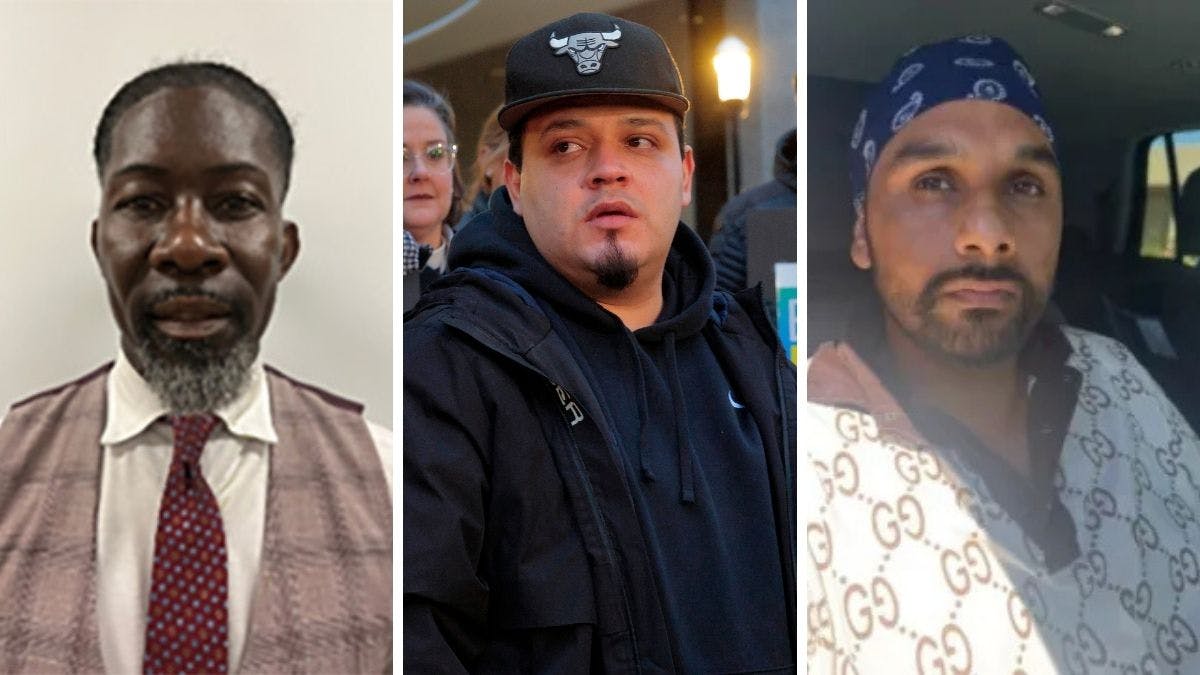Supreme Court Ruling, UPenn Settlement Signal Major Shift on Transgender Issue

In the final weeks of its 2024-25 term, the Supreme Court ruled to uphold Tennessee’s restrictions on gender-affirming medical care for minors.
Live Your Best Retirement
Fun • Funds • Fitness • Freedom
The high court’s decision in U.S. v. Skrmetti preceded the University of Pennsylvania’s announcement on Tuesday that it would prohibit transgender women from participating in women’s athletic competitions. The university also extended formal apologies to female athletes who were impacted by its previous policies, including women’s sports advocates Riley Gaines and Paula Scanlan.
The Daily Signal discussed the Supreme Court’s ruling and Penn’s decision with Jay Richards, director of The Heritage Foundation’s DeVos Center for Life, Religion, and Family. Richards explained the Penn developments, detailed the significance of U.S. v. Skrmetti ruling, and discussed the implications of these developments.
His interview transcript has been edited for length and clarity.
Philip Roberts: The Trump administration and University of Pennsylvania announced a settlement this week regarding transgender athletes. Can you explain what happened?
Jay Richards: The most important thing about the settlement … is that the University of Pennsylvania is now admitting that biological sex is the relevant category when it comes to the sports leagues.
That sounds a little silly because it’s so obvious, but its previous policy basically fundamentally denied that sex was the relevant category. It said, “Well, female sports are for people that identify as female. If Will Thomas, the mediocre swimmer, decides he’s female, that’s all that’s relevant.”
Under the Biden administration’s misinterpretation and manipulation of Title IX, schools like the University of Pennsylvania felt safe to do that.
But President Trump and his administration made clear that not treating females as females and males as males is a violation of Title IX itself.
Colleges are always terrified about not being able to get federal funding for their students, not being able to get federal student loan aid, so once they realized the administration was pursuing that, it snapped them back into their senses.
Basically, Penn said that men compete in men’s sports. And the university also apologized specifically for the things that it has done.
That’s huge. But I do think just the fact that Penn conceded that, yes, biological sex is a relevant category … [is] the most important thing about the decision.
Roberts: What does the settlement mean for other universities that allowed male athletes who identified as females to compete in women’s sports?
Richards: What Penn did is, more or less, what most state and elite private schools … have been doing, which is accepting the terms of gender ideology.
I know of no instances where a female is trying to compete in male college sports. It’s always in one direction.
What I hope will happen is that the University of Pennsylvania’s decision will have a massive downstream effect for other colleges because they will see which way the wind is blowing.
Roberts: This news came on the heels of the U.S. Supreme Court’s ruling in U.S. v. Skrmetti. What was at stake in this case?
Richards: There were a few things at stake.
The primary question for the court was fairly narrow. It’s whether SB1, which is the name of the bill in Tennessee that basically prohibits “gender-affirming medicine”—which I would call sex-rejecting transition procedures—for minors, violated the Equal Protection Clause by constituting discrimination based on sex.
The ACLU and Lambda Legal … argued that this was sex discrimination to do this, hoping to draw on and expand the Supreme Court’s 2020 decision Bostock [v. Clayton County], which involved employment.
[The Supreme Court] ruled that, “No, this law in Tennessee does not constitute sex discrimination.” That’s the kind of narrow thing.
The broader cultural/legal context is that the court allowed the law in Tennessee to remain, so they didn’t strike it down.
We now have, as of 2025, about 27 states that have laws like Tennessee. This is going to have this massive downstream effect.
Almost all these laws are being litigated somewhere. The first one to get the Supreme Court was Tennessee. Tennessee’s law is actually stronger than a lot of the others.
In some ways, I’m sure the ACLU thought it would be easier to defeat than maybe some of the more modest laws like Utah’s.
But you could put it this way: If even Tennessee’s law is constitutional, according to the Supreme Court, virtually all the other state laws on that should be, too.
Roberts: Why was this one of the court’s most important decisions this term?
Richards: This has been a season of really, really important Supreme Court decisions.
At least for those of us that have been focusing on the gender ideology fight, this was the big decision because we have spent essentially four years working with states.
We, and other members of the coalition, have been working with states to pass these laws because we think this was, first of all, the place in which the scientific evidence was pointing very directly in the opposite direction against so-called gender affirming care.
The laws were very carefully crafted, but they all hung in the balance until one of these laws could be considered by the U.S. Supreme Court.
It’s all new territory. States didn’t have definitions of male and female. The federal government didn’t really, until recently, have a definition of male and female.
[The ruling on U.S. v. Skrmetti] is narrow, but it’s more than broad enough to justify these laws in other states and comparable initiatives as well.
I have another point I’ll make. [The courts are also] a cultural institution. And so ideally, justices would simply rule on the law and the merits of the law in question.
But it’s a cultural institution in the sense that the opinions of jurists and justices often reflect mainstream culture.
If this case had been heard, say in 2019 or 2020, it might’ve gone a different way. But what’s happened is a complete culture change, a vibe shift has taken place on gender ideology, and you’re seeing it even in the last few weeks.
You’ve have an Atlantic magazine piece, a New York Times magazine investigative piece saying, “Look, the evidence in favor of these procedures is just not there.”
And so, it was just about as soon as it would’ve been safe for the Supreme Court to hear this, but then notice it still ultimately was divided by the six most conservative judges voting to uphold the law and the three most liberal judges voting against it.
That’s unfortunate, but I think at least it wasn’t 5to 4. And I suspect that a few years from now, everyone—including those three justices [that dissented in U.S. v. Skrmetti]—will quietly accept that … this was a crazy moment in our history.
Roberts: How have transgender advocacy groups responded to these recent developments?
Richards: Public interest law groups that brought the case are really, really upset about it for obvious reasons.
They’re saying what you’d expect them to say: that this is a violation, this is sex discrimination, this is targeting transgender people—which is how they always frame this—and that life and death are at stake.
At the same time, there also seems to be some gut-checking and reconsideration by those groups about whether the strategy they pursued thus far was the right one.
What happened is that the gender ideologues and the activist groups—Human Rights Campaign, ACLU—decided to go all in and emphasize even the most radical aspects of this as opposed to a super incremental strategy.
They’re pushing drag queen story hours. They’re pushing sterilizing surgery on minors. They’re pushing pornographic curricular material for elementary and middle school.
That functioned to alert ordinary Americans that whatever this is, it’s seriously bad. I can say even as recently as 2022, most Republicans didn’t really want to talk about this issue.
It seemed kind of weird to them, but I think in many ways, it was just the rabid advocacy on the other side that woke up a lot of people about frankly how diabolical this ideology is.
It wasn’t just parents who were affected by it directly. It wasn’t just policy people focusing on it. Average Americans realized, “OK, this is a bad thing.”
I know that some of the activist groups … are probably privately talking about whether that was a good idea or not. But the conversation they should be having is whether it was wise to come between parents and their children, because that’s what they did.
Roberts: What’s the next inflection point for conservative policy groups on this issue?
Richards: There are a number of things that still need to happen in states, and The Heritage Foundation has model legislation on it.
We have a bill to define male and female precisely, which still really needs to be done.
We have a bill that will assure that states don’t allow people to change their legal birth certificates and driver’s licenses and other personal identifying documents to falsify it. In other words, if a person’s a male, [he can’t] have his birth certificate changed to say he’s female.
The other one is that [in] lots of states, including some red states, Child Protective Services has been weaponized against parents so that parents can get in trouble simply for affirming the sex of their child.
There are actually cases in which Child Protective Services has taken children away from their parents because the child claimed a gender identity different from his or her biological sex.
A bill that we’ve modeled says that affirming your child’s biological sex can’t be construed as abuse. Unfortunately, it has to be done. That’s going to be at the state level.
At the federal level, what we’re going to see is a lot more action by the Trump administration against these gender clinics in the states.
In fact, the Department of Justice is focusing on it. The FTC is focusing on it. The Department of Education and HHS all are focusing on these things.
If I was running a pediatric gender clinic, I would not be sleeping very well right now.
The post Supreme Court Ruling, UPenn Settlement Signal Major Shift on Transgender Issue appeared first on The Daily Signal.
Originally Published at Daily Wire, Daily Signal, or The Blaze
What's Your Reaction?
 Like
0
Like
0
 Dislike
0
Dislike
0
 Love
0
Love
0
 Funny
0
Funny
0
 Angry
0
Angry
0
 Sad
0
Sad
0
 Wow
0
Wow
0









































































